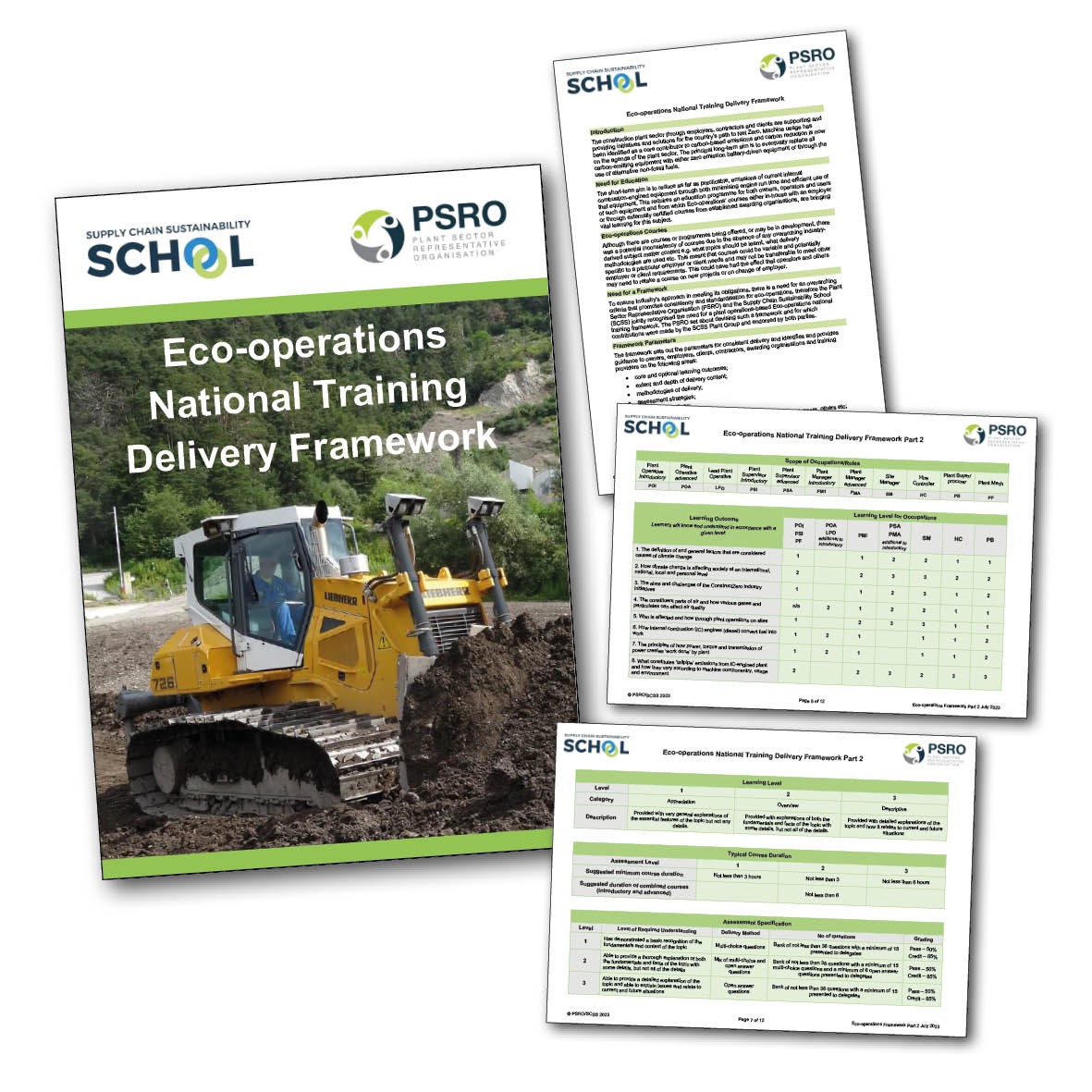Updates, Downloads and Links
PSRO Projects
Current PSRO projects include:
-
- Maintenance of the plant occupations competency framework
- Technical support to the CITB plant operations short duration training standards
- Maintenance of a national Eco-operations national framework in partnership with the Supply Chain Sustainability School
- Support for Plant-based Apprenticeships in Wales and England


PSRO Updates
The PSRO Board met in mid-February 2024. with the main thrust of the meeting being the nomination of a new Chair and Vice-chair. CECA were nominated as Chair of the Board for the next term with the NFDC as Vice-chair. The Board meeting notes can be downloaded below.
The Technical Review Group continue to provide further guidance to CITB on the first tranche of plant operations training standards and have now launched, in conjunction with the Supply Chain Sustainability School (SCSS) an Eco-operations Training Delvery Framework. More details below.
Applications can be made by certificating bodies seeking PSRO approval to attain the CSCS logo. Forms – application form and Annex A – can be downloaded from the PSRO downloads section, using the link below.
PSRO Webinar
A webinar was organised by the PSRO on 17 May 2023 with the aim of allowing delegates to gain an understanding of progress with the PSRO formation and work carried out to-date as well as providing information about the recent update to the Construction Leadership Council (CLC) Skills Strategy and its potential impact on the plant sector.
The webinar was opened by Kevin Minton, acting chair of the PSRO before undertaking a presentation on why the PSRO came into being, how it was formed and by whom, what the current structure is and what the long term aims and objectives are.
This was followed by a presentation from Alasdair Reisner, CEO of the Civil Engineers Contractors Association (CECA) and a PSRO Board Member, who gave an update on the Construction Leadership Council’s (CLC) 2023/2024 skills strategy and covered the topics of culture change, routes into industry, competence, and skills for a modern industry.
Alasdair’s session was subsequently followed by a panel discussion with some members of the PSRO Technical Review Group and included Aaron Davies of Flannery Plant, Kevin Fairholm of the GGR Group and the CPA Secretariat – Peter Brown and Nick Gooderson. The group answered a series of questions posed by the PSRO Chair before receiving and answering questions from delegates. The webinar lasted for approximately two hours.
The recording of the webinar can be viewed at: https://youtu.be/HRpZWa4dgL0.
Slides from the webinar can be downloaded below.


PSRO SCSS Eco-operations National Training Delivery Framework
The construction plant sector is providing initiatives and solutions for the country’s path to Net Zero, with machine usage identified as a contributor to carbon-based emissions. The long-term aim of the sector is to replace all carbon-emitting equipment with zero or low emission-powered versions, however in the short-term, the aim is to reduce as far as practicable, engine-derived emissions through both minimising engine run time and efficient use of that equipment. This requires an education programme for both owners, operators and users of such equipment and from which eco-operation courses, either in-house with an employer or through externally certified courses from established awarding organisations, are bringing vital learning for this subject.
To ensure Industry’s approach in meeting its obligations, there is a need for an overarching criteria that promotes consistency and standardisation for eco-operations, therefore the Plant Sector Representative Organisation (PSRO) and the Supply Chain Sustainability School’s (SCSS) Plant Group have worked together in order to develop a training-delivery framework.
The framework sets out the parameters for consistent delivery and identifies and provides guidance on areas such as core and optional learning outcomes, delivery content and methodologies, assessment strategies and course durations. As the learning content can vary for a number of occupations, the framework further identifies individual course content and delivery factors for plant operatives, supervisors, plant and site managers, planners, plant procurers, maintenance personnel etc.
The aim is that on completion of a course based on this framework, delegates should have attained a required level of understanding on the principles of reducing machine-based carbon emissions, enabling them to recognise and apply learnt reduction techniques, operational processes and emerging machine technologies with a desired outcome that each delegate takes personal ownership of the need to reduce emissions.
The framework is divided into three parts with part one outlining the aims and principles of the framework, part 2 identifying the delivery aspects for the relevant occupations whilst part 3 specifies the learning outcomes and training specification.
The framework can be downloaded below.
More information on the work of the SCSS Plant Group can be found using the link below.
Downloads
Links

